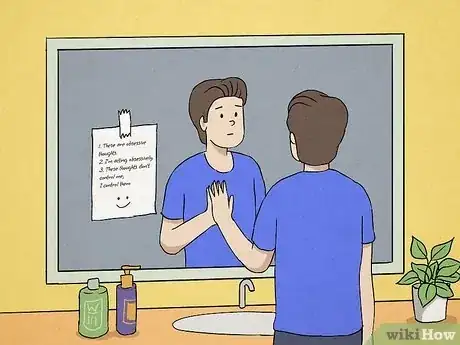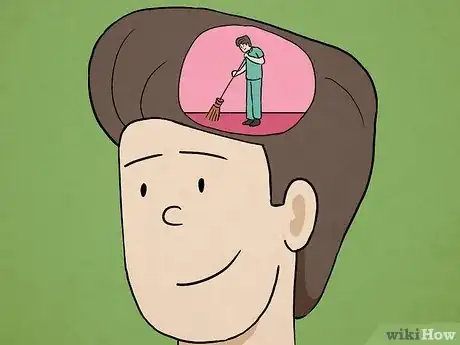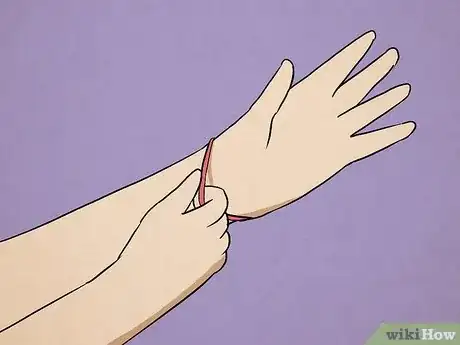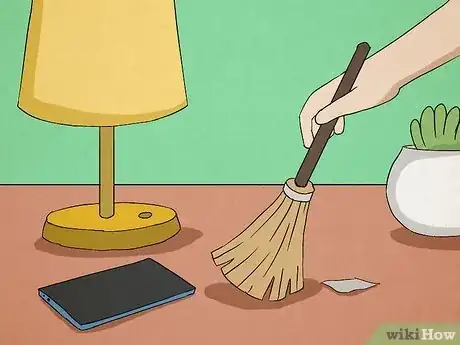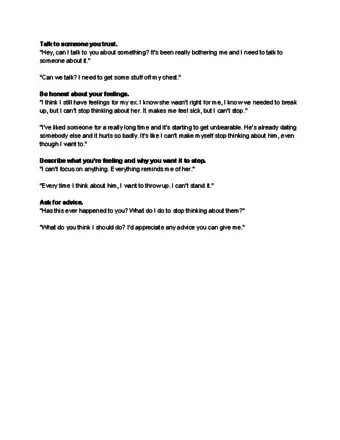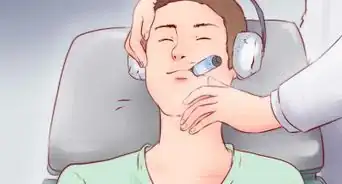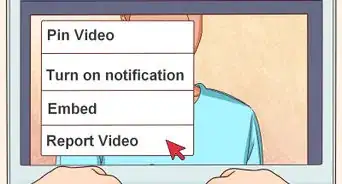This article was co-authored by Samantha Fox, MS, LMFT. Samantha Fox is a Marriage & Family Therapist in private practice in New York, New York. With over a decade of experience, Samantha specializes in relationship, sexuality, identity, and family conflicts. She also advises on life transitions for individuals, couples, and families. She holds both a Master’s degree and a Marriage and Family Therapy License. Samantha is trained in Internal Family Systems (IFS), Accelerated Experiential Dynamic Psychotherapy (AEDP), Emotion Focused Couples Therapy (EFT), and Narrative Therapy.
There are 13 references cited in this article, which can be found at the bottom of the page.
wikiHow marks an article as reader-approved once it receives enough positive feedback. This article has 19 testimonials from our readers, earning it our reader-approved status.
This article has been viewed 1,497,580 times.
When you like someone, it can be so tough not to obsess. You might feel like you think about them constantly with no control. But trust us, that couldn't be further from the truth! With a little guidance and some pro tips, you'll be able to get ahold of your thoughts and feelings, and stop obsessing ASAP. Ready to learn more? Read on.
Steps
Controlling Obsessive Thoughts
-
1Avoid things that remind you of them. Notice when and where you start to think or act obsessively. It might be difficult, especially at first, but do your best to resist obsessive urges when you face a trigger. If you can’t remove yourself from the trigger, focus on controlling your response to it.[1]
- For instance, if you constantly check the person’s social media profiles or get the urge to text them, getting rid of your phone or computer isn’t practical. Instead, you could use features that remove their posts from your newsfeed or unfollow them.
- If you’re obsessing over your ex, give them their stuff back and try to keep things that remind you of them out of sight and out of mind.[2]
- If you can’t avoid being around the person, try to keep your distance. If they sit next to you at school, try to avoid eye contact and imagine they’re someone else. Try to focus on your task at hand, like taking class notes.
-
2Identify your obsessive thoughts and behaviors. Take note of when you can't get your mind off of the person. You might want to check their social media profiles, or get the urge to call or text them. Call yourself out, and tell yourself that you have the power to redirect your thoughts.[3]
- Tell yourself, “These are obsessive thoughts,” or “I’m acting obsessively.” Say, “These thoughts don’t control me; I control them.”
- Sometimes, obsessive thoughts and actions can go unnoticed, or they might even feel good. Trying to pretend they don’t exist won’t do you any good. Instead, recognize them, acknowledge that you have better things to do, and remind yourself that you can manage them.
Advertisement -
3Determine if there are any underlying factors causing your obsession. Obsession, like addiction, can sometimes be a symptom of a larger need or problem in your life. Consider if there is something missing in your life that you thought this person could provide. See if there is another way you can find what you need.[4]
- Often, becoming obsessed with someone is a way to get a feeling of belonging or approval from someone other than yourself.[5]
- Write down what this person makes you feel when you are with them. Think about how you feel when they are gone. Consider what might be causing these feelings in your life.
- For example, you might discover that you are afraid of being lonely. If this is the case, consider joining a class or club to meet new people.
-
4Focus on the details of your present surroundings. When you feel yourself getting fixated, take a deep breath and close your eyes. Listen carefully to the sounds around you and think about all of the other sensations you’re experiencing at that moment.[6]
- Ask yourself, “What’s the temperature right now? Am I hot, cold, or comfortable? What sounds and smells am I sensing right now? What is the weather like right now? What does the sky look like?”
- Obsession often involves thoughts like, “What if I did this?” or “What are they doing right now?” These thoughts focus on other locations or dwell on the past or future. Concentrating on your surroundings can help you keep your thoughts in the here and now.
-
5Visualize intrusive thoughts leaving your mind. Try imaging your mind as a floor, and your obsessive thoughts are dirt and dust covering the floor. Whenever you start to dwell, visualize yourself sweeping away all the dust and dirt with a broom.[7]
- You could also imagine that the intrusive thoughts are a barking dog. Visualize yourself walking by a barking dog behind a fence. Say to yourself, “It’s just noise, and the dog can’t hurt me. In a few minutes, I’ll cross to the next block and the dog will be far behind me.”
- Try shaking off obsessive thoughts. When you experience them, shake your head, arms, legs, and body. Imagine that you’re shaking out the thoughts and resetting your mind.
-
6Develop a ritual that reminds you to stop obsessing. When you think about the person or get the urge to contact them, imagine a big stop sign. You could also wear a rubber band around your wrist and snap it whenever you think or act obsessively.[8]
- Rituals, such as visualizing a stop sign or snapping a rubber band, are good ways to remind yourself that you need to redirect your thoughts. Do your ritual, then tell yourself, “Stop! I need to stop this thought pattern and do something to distract myself.”
Keeping Your Mind Occupied
-
1Distract yourself by doing an enjoyable activity. Think of a few activities that you find interesting and enjoyable. Keep a mental list of things to do when you start to obsess. If you have a list of go-to activities in mind, you can quickly redirect yourself when necessary.[9]
- Examples might include gardening, reading a good novel, listening to music (that doesn’t remind you of the person), playing a video game, playing an instrument, drawing, painting, or exercising.
-
2Do something that gives you a feeling of accomplishment. Think of a project you’ve put on the back burner recently. While it doesn’t need to be related to the person, it might be something you’ve put off because of obsessive thoughts or actions. Finish that project, and think about how it represents your ability to move past your obsession.[10]
- For example, perhaps you haven’t been practicing the piano or cleaning your room. Maybe you've been falling behind on projects at work or school.
- Accomplishing a task, especially one you’ve been putting off, is a great way to cultivate a positive, self-empowering state of mind.
- If you can learn to soothe and satisfy your own needs, it will be easier to stop obsessing over someone else.[11]
-
3Try writing down your obsessive thoughts. If you have trouble changing your thought patterns, write down your thoughts by hand. Describe your emotions, write a letter to the person you’re obsessed with, or write down phrases or words you can’t get out of your head.[12]
- Don’t show what you’ve written to the person you can’t stop thinking about. Additionally, don’t read what you’ve written and dwell on it.
- Instead, focus on getting the thoughts out of your head as you write. Tearing up the paper and throwing it away when you’re finished can help you symbolically let go of your obsessive thoughts.
-
4Meditate or try relaxation techniques. Wear loose clothing, play soothing music, and sit in a comfortable position. Inhale deeply as you count to 4, hold your breath for a 4 count, then exhale slowly as you count to 8. As you control your breathing, visualize calming scenery, such as a safe place from your childhood or a favorite vacation spot.[13]
- You could also look for guided meditation videos on your preferred streaming service.
- Try meditating or doing breathing exercises when you feel your thoughts racing, dwell on the person you’re obsessed with, or get the urge to call or text them.
Seeking Support from Others
-
1Call or hang out with loved ones when your mind starts racing. You don’t need to tell the person your reason for calling them or talk about your obsession. It could be your best friend, sibling, or someone you haven’t talked to in a while. Chat with them, or ask them to go for a walk, meet for coffee, have lunch, or do another activity together.[14]
- Say, “Hey, how are you? I just wanted to touch base and see how you’ve been. Anything new?” Try asking, “Do you have any plans today? Want to grab a coffee or lunch?”
- Staying social can help you get your mind off of your obsession, so do your best to maintain your relationships in general.[15]
-
2Vent your emotions to a trusted loved one. Whether you’re obsessing over an ex, a crush, or someone you envy, bottling up your emotions will just make matters worse. Confiding in someone could take some weight off of your shoulders and help clear your mind.[16]
- Try telling a friend or relative, “I need to get some stuff off of my chest. I like someone, but they don’t feel the same way about me. It makes me so upset I feel sick, and I can’t stop thinking about them.”
- While just talking about your feelings can help, you can also ask for advice. Ask them, “Have you ever felt like this? What did you do to stop thinking about someone?”
-
3Talk to a counselor, if necessary. If you take steps to control your thoughts and distract yourself, your feelings will likely improve with time. However, if you can’t change your focus or if things don’t eventually improve, it might be best to see a professional. A therapist won’t judge you or tell anyone about your feelings. Their job is to help you, so be honest with them.[17]
- Emotions don't have a strict timeline. However, you should notice yourself gradually thinking about them less as weeks and months pass, and your feelings should become less intense.
- It might be time to see a professional if you've tried unsuccessfully on your own for at least 1 or 2 months. You should also get help if your obsessive thoughts become more frequent, or if you experience recurrent feelings of despair, withdraw from daily activities, or think about hurting yourself or others.
- If you’re still in school and don’t want to ask your parents to take you to a therapist, you could talk to your guidance counselor.
Help Handling Obsessive Thoughts
Expert Q&A
-
QuestionIt's been almost seven months, and I think about him and his family a lot less than I used to, but I'm tired of them lingering in my head. What should I do?
 Paul Chernyak, LPCPaul Chernyak is a Licensed Professional Counselor in Chicago. He graduated from the American School of Professional Psychology in 2011.
Paul Chernyak, LPCPaul Chernyak is a Licensed Professional Counselor in Chicago. He graduated from the American School of Professional Psychology in 2011.
Licensed Professional Counselor Try to fill your life with other meaningful relationships as they will probably help fill the void that he left in your life.
Try to fill your life with other meaningful relationships as they will probably help fill the void that he left in your life. -
QuestionIs it right to be in a long distance relationship with someone whom you see no future if you love that person a lot and he also loves you?
 Paul Chernyak, LPCPaul Chernyak is a Licensed Professional Counselor in Chicago. He graduated from the American School of Professional Psychology in 2011.
Paul Chernyak, LPCPaul Chernyak is a Licensed Professional Counselor in Chicago. He graduated from the American School of Professional Psychology in 2011.
Licensed Professional Counselor If you can only remain friends then make your intentions clear. The longer you avoid the issue directly the stronger the problem will become.
If you can only remain friends then make your intentions clear. The longer you avoid the issue directly the stronger the problem will become.
References
- ↑ https://www.psychologytoday.com/us/blog/the-mysteries-love/201610/how-stop-thinking-about-ex
- ↑ https://www.psychologytoday.com/us/blog/the-mysteries-love/201503/top-10-ways-get-over-breakup
- ↑ https://www.health.harvard.edu/mind-and-mood/managing-intrusive-thoughts
- ↑ https://www.psychologytoday.com/us/blog/happiness-in-world/201004/obsession
- ↑ Samantha Fox, MS, LMFT. Marriage & Family Therapist. Expert Interview. 19 January 2021.
- ↑ https://www.psychologytoday.com/us/blog/insight-is-2020/201612/stop-obsessing-or-fixating-fast-cognitive-technique
- ↑ https://adaa.org/learn-from-us/from-the-experts/blog-posts/consumer/unwanted-intrusive-thoughts
- ↑ https://counseling.uoregon.edu/how-stop-obsessing
- ↑ https://www.psychologytoday.com/us/blog/happiness-in-world/201004/obsession
- ↑ https://www.psychologytoday.com/us/blog/happiness-in-world/201004/obsession
- ↑ Samantha Fox, MS, LMFT. Marriage & Family Therapist. Expert Interview. 19 January 2021.
- ↑ https://www.psychologytoday.com/us/blog/the-mysteries-love/201610/how-stop-thinking-about-ex
- ↑ https://www.psychologytoday.com/us/blog/happiness-in-world/201004/obsession
- ↑ https://psychcentral.com/blog/sobriety-for-a-love-addict/
- ↑ https://www.helpguide.org/articles/anxiety/obssessive-compulsive-disorder-ocd.htm
- ↑ https://www.psychologytoday.com/us/blog/valley-girl-brain/201105/how-want-get-over-breakup?collection=65090
- ↑ https://www.psychologytoday.com/us/blog/i-hear-you/201804/six-psychological-strategies-getting-over-bad-breakup
About This Article
To get over someone you obsess over, try to eliminate things that make you think of them. For example, if you're obsessing over your ex, you could get rid of pictures you have of the two of you. Or, if your obsessive thoughts are triggered when you see the person on social media, you could block them so you don't see their posts. You can also try distracting yourself whenever you start thinking about the person by doing an activity you enjoy, like playing video games, reading, or going for a walk. Additionally, spend time with your friends and family when you're feeling sad or anxious, which can help keep your mind off of things. For more tips from our Counselor co-author, like how to control obsessive thoughts, keep reading.

